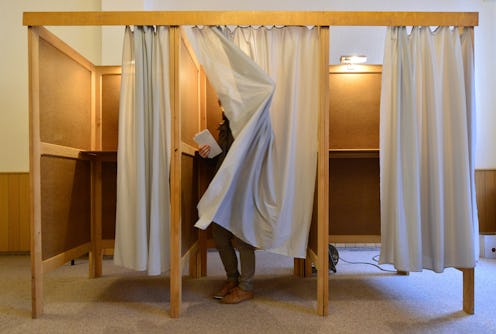News
Wisconsin's Delegates Could Give Candidates A Bump
On Tuesday, both the Republicans and the Democrats will hold their primary elections in Wisconsin. Democratic frontrunner Hillary Clinton and Republican frontrunner Donald Trump will look to further their steady leads over Sen. Bernie Sanders and Sen. Ted Cruz, respectively, while Cruz and Sanders will try to narrow the delegate gaps. How many delegates does Wisconsin have? It's a big-deal state with a lot at stake, and the polls promise tight races.
The Democratic candidates will be vying for 86 pledged delegates and 10 superdelegates in the state, a total of 96 delegates, while the Republicans will compete for 42. As with all states, the Democratic delegates will be allocated proportionally, meaning candidates will get roughly the same percentage of delegates as they do the popular vote (adjusted with some rounding). Things are more complicated on the Republican side.
The elections blog Frontloading HQ explains that Wisconsin has 18 delegates which will all be awarded to the Republican candidate who wins a plurality of the statewide vote (a plurality means "the most," but not necessarily a majority). The remaining 24 are congressional district delegates; each district has three. Whomever wins a plurality within a given congressional district gets all three of its delegates. This is referred to as a "winner-take-most" system of allocation.
There hasn't been much recent polling in Wisconsin, but the averages compiled by Real Clear Politics suggest that the primaries could both be nail-biters. Two polls, one from February and one from late March, show Clinton with an average lead of just 2.5 percent over Sanders. Three polls, all from late March, show Trump and Cruz neck-and-neck, separated by only 0.7 percent. Gov. John Kasich isn't faring poorly in the state either; he's at 23 percent, compared to Cruz's 33 and Trump's 32.3.
On the Democratic side, Sanders can realistically hope to at least prevent the delegate gap from widening. A big win in the state would narrow the gap, continuing what started on March 26, when Sanders swept Washington, Hawaii, and Alaska. On the Republican side, it's less predictable how the delegate split could go, given the state's winner-take-most rules. Whomever wins a plurality of votes will have an instant 18-delegate bump. But the distribution of the 24 congressional district delegates will come down to how concentrated each candidates' voter base is within Wisconsin.
Polls in Wisconsin don't close until 9 p.m. ET, meaning we won't have results until late Tuesday night. There's a lot at stake for every candidate, and many of us will no doubt be burning the midnight oil refreshing webpages to keep track of vote percentages and delegate earnings as the numbers roll in.
